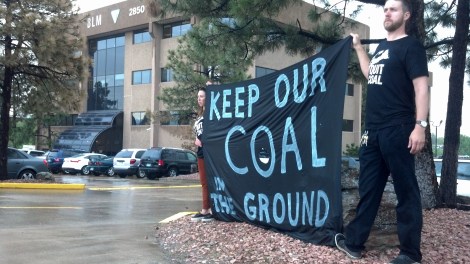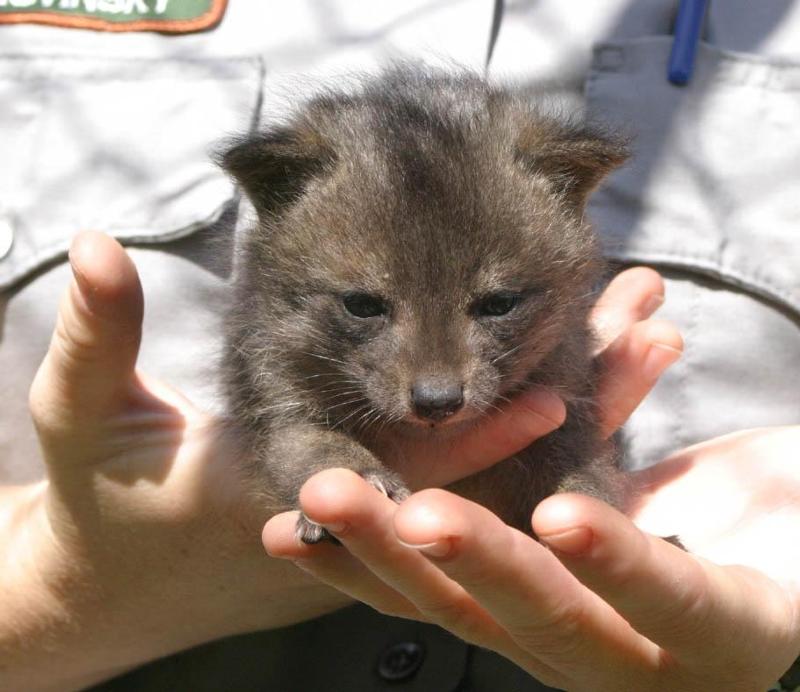
Activists call on Secretary Jewell to Keep Our Coal in the Ground at the Colorado State BLM office, May 29, 2013
Protesters called on Interior Secretary Sally Jewell to “Keep Our Coal in the Ground” as the Department of Interior held a lease sale for 21.3 million tons of coal at the Colorado Bureau of Land Management (BLM) field office today. While the BLM called this a “competitive” coal lease, as usual only one company, Blue Mountain Energy, submitted a bid for the coal. The coal company, which hopes to expand its Deserado mine that supplies coal to the Bonanza coal plant in Utah, offered $6,390,000 – amounting to just 30 cents a ton.
This coal lease is a reminder of Secretary Jewell’s responsibility to reform the federal coal leasing program, WildEarth Guardians, Utah Physicians for a Healthy Environment, and Greenpeace argued in a Denver Post oped, “Fix federal coal lease program“
Deserado is what’s known as a “captive” mine. Its coal fuels only the Bonanza power plant in neighboring Utah, which is connected to the mine by a 30-mile rail line.
The Bonanza plant’s 600-foot smokestack churns out 4.5 million metric tons of carbon pollution each year — equivalent to the annual emissions of 1 million cars — fueling climate change impacts like widespread drought, more intense heat and wildfires, and stronger storms, especially in the West. Not surprisingly, Bonanza is also one of the biggest sources of smog-forming pollution in the region. That’s significant because we now know that northeastern Utah and northwestern Colorado — an area called the Uinta Basin — are violating federal limits on ground-level ozone, the key ingredient of smog.
That’s not the end of it. The Bonanza plant is a key source of particulate matter and sulfur dioxide, pollutants that cause all the same diseases as cigarette smoke: heart and lung disease, strokes, numerous cancers, pregnancy complications, impaired fetal development and even premature death. If the BLM auctions off this coal, it will be unlocking huge amounts of dangerous air pollution and serious public health consequences.
And yet, in proposing to auction off this latest coal lease, the BLM refused to consider the impacts of the Bonanza power plant, absurdly insisting in its environmental assessment that what happens to the coal after it’s leased is beyond the scope of its review.
Making this even more outrageous is that this coal is owned by U.S. taxpayers, and the BLM is supposed to be managing it “in the best interests of the nation.” As the impacts of fossil- fueled climate change become ever clearer, any honest appraisal would show that our best interests are served by leaving this coal in the ground.
Sadly, this Colorado coal scandal is emblematic of more widespread denial within Interior’s coal leasing program. In just the last two years, the BLM has leased over 2 billion tons of publicly owned coal in the Powder River Basin of Wyoming and Montana. This coal will release nearly 3.5 billion metric tons of carbon pollution when burned, far more than the annual emissions from all the cars and trucks in the U.S. Just as in Colorado, the environmental reviews have ignored the massive amounts of pollution unlocked by these coal leases.
Last week, Secretary Jewell was directly challenged about her plans to place a moratorium on federal coal leasing when she visited Oregon. As coal companies seek to export massive amounts of publicly owned coal through Oregon and Washington, the role of the Interior Department’s coal leasing program in subsidizing the coal industry has come under increasing scrutiny from public officials, activists, and communities in the Pacific Northwest. Secretary Jewell declined to answer the question directly, instead offering some comments on the importance of public engagement; “The coal export issue goes well beyond just the resource part that we have, and I think that public engagement is very important in that process to understand what all the issues are so they can be out on the table and transparently discussed.”
The problem is, the federal coal leasing program has been run for the benefit of the coal industry for decades, with very little public engagement, or even much consideration of the public at all. Secretary Jewell can change that, but today’s coal lease shows that the federal coal leasing program continues to undermine President Obama’s commitment to address climate change.


